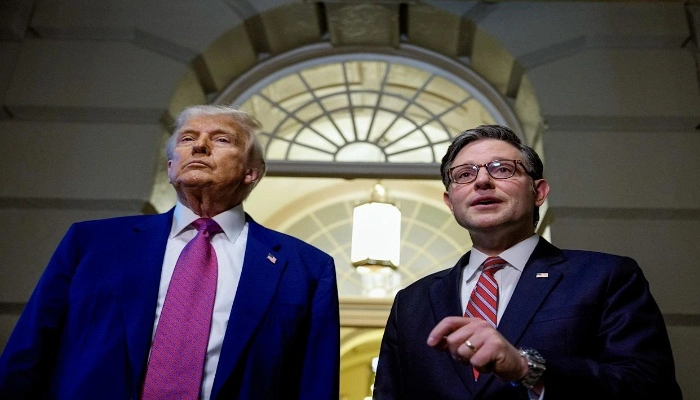
WASHINGTON After a marathon hearing, the Republican-held House Republicans Rules Committee pushed forward a massive package for President Donald Trump’s agenda Wednesday night, readying it for a vote in the full chamber.
The committee members began meeting at 1 a.m. ET on Wednesday and wrapped up around 10:40 p.m. ET before voting on the legislation, 8-4, along party lines.
The vote came hours after Republicans issued a series of final amendments to their huge bill, resolving some differences and cajoling holdouts, such as the hard-right Freedom Caucus and a group of relatively moderate, blue-state Republicans, whose backing was in doubt.
The 42-page addendum to the multi trillion-dollar package also involves accelerating the date that work requirements would be enforced for some Medicaid participants by two years, to the end of 2026, winding down clean energy tax credits more quickly, and expanding the federal deduction for state and local taxes to $40,000 for individuals earning less than $500,000 a year.
It’s not clear when the package will go to the House floor for a vote. With the chamber’s majority leader, Representative Mike Johnson, Republican of Louisiana, clinging to only a three-seat majority, he said he hoped to hold the vote on Wednesday night or Thursday morning.
Here are a few of the most significant changes to Trump’s “big, beautiful bill” Republicans made Wednesday.
Medicaid changes
As a concession to conservative hard-liners in the House Freedom Caucus, the agreement accelerates the schedule by which work requirements would start to apply for able-bodied adults from 18 years old to 64 to receive Medicaid benefits.

The original House Energy and Commerce Committee bill had work requirements kicking in at the start of 2029. But anti-spending hawks, led by Freedom Caucus Chairman Andy Harris, R-Md., wanted some of them to start “not later than Dec. 31, 2026,” which would have made savings accrue potentially years earlier.
The new language would also give states the flexibility to advance the date if they wanted.
Moving up the start date would have the effect of millions of people losing Medicaid before the 2028 presidential election, and potentially some people losing benefits before the midterm election in 2026. That could be a political liability for Republicans all the way up and down the ballot, though Trump and congressional GOP leaders say they are simply flushing out “fraud, waste and abuse.”
In another major change, states which had refused the Medicaid expansion under the Affordable Care Act would receive higher payments as a reward to persuade them not to expand the program.
Clean energy credits
The Freedom Caucus was guaranteed another win in its 11th-hour talks: accelerating the phaseout of clean energy tax breaks, an effort to distance President Joe Biden’s Inflation Reduction Act from its former leader.
In an effort to solidify support, House Republicans have introduced major changes to a key tax bill aligned with former President Donald Trump’s agenda. The updated legislation aims to phase out renewable energy incentives and offer relief to taxpayers in high-tax states.
Cuts to Renewable Energy Incentives
Under the revised measure, production and investment tax credits for new clean energy facilities such as wind and solar projects—would be eliminated if construction starts 60 days after the bill becomes law or after 2028, whichever comes first. Additionally, the bill seeks to repeal tax benefits tied to wind and solar property leasing arrangements.

“We worked with the White House to get important revisions to expedite the phase-out,” said House Majority Leader Steve Scalise (R-La.). “President Trump doesn’t want these [clean energy subsidies], and we agreed on strict language to block most new projects.”
SALT Cap Increase for Middle-Income Families
Republicans representing high-tax states pushed for a major update to the bill’s State and Local Tax (SALT) deduction cap. The original bill proposed raising the cap from $10,000 to $30,000, but members of the bipartisan SALT Caucus deemed it insufficient.
In the revised version, the SALT cap would rise to $40,000 for individuals earning less than $500,000 annually, with both the income threshold and cap increasing by 1% per year for the next decade.
“This is the No. 1 federal issue for my constituents,” said Rep. Nick LaLota (R-N.Y.). “If I took a bad deal, even my own mother wouldn’t vote for me. It’s time to fix what we got wrong in 2017 and deliver on our promises.”
‘MAGA Accounts’ Rebranded as ‘Trump Accounts’
In a lighter amendment, Republicans have renamed a provision in the bill that allows tax-advantaged savings accounts for children. Previously dubbed “MAGA Accounts,” these will now be called “Trump Accounts.” The official change appears in the amendment language: “Page 10, in the item relating to section 110115, strike ‘MAGA’ and insert ‘Trump’.”



